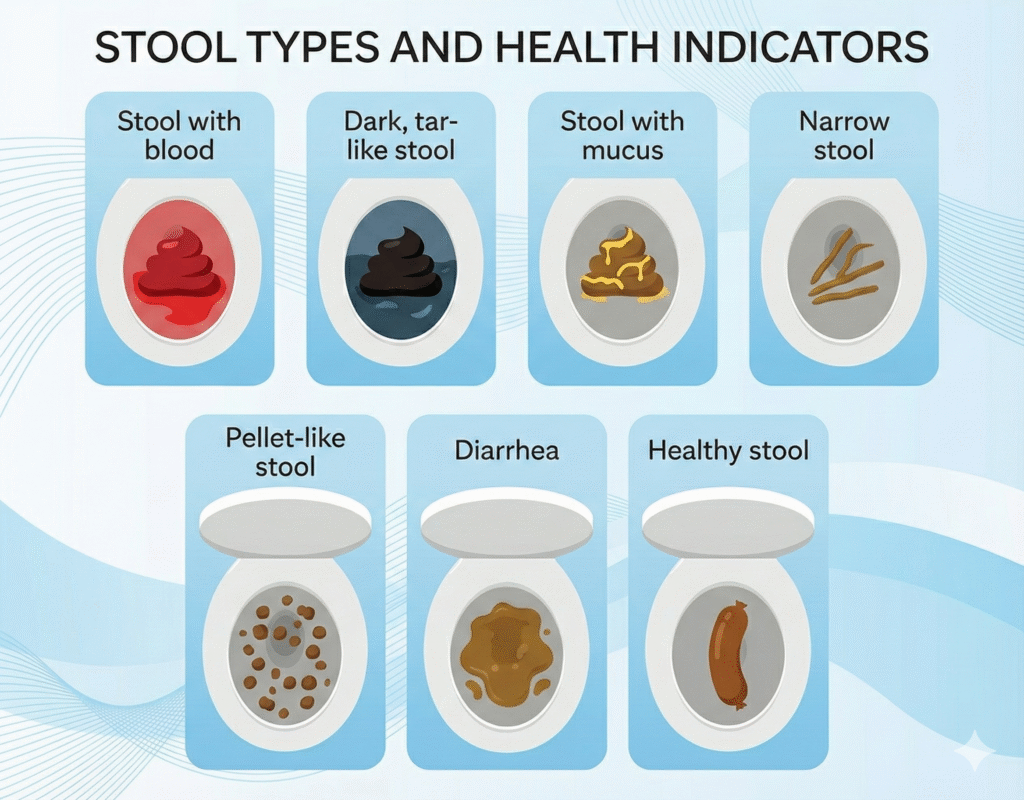Changes in Stool Manner May Signal Colon Cancer
Colon cancer constitutes one of the major causes of cancer global depictions and thus remains a top priority in the fight against cancer. Consequently, the outcomes of colon cancer improve substantially when it is detected early. Among the simplest ways of checking on yourself is watching your bowel habits. It is not true that any change in the stool appearance means cancer, however, some changes are so significant that you must see a doctor without delay.
Why Is Colon Cancer Affecting the Way Stools Look?
Among the major functions of the colon are the processing of digested food, the reabsorbing of water, and the forming of stool for getting rid of it. When a cancer starts to grow in this fragile system, it can change the speed, the shape, and the type of stool going through the colon. To put it simply, cancer can block the bowel, cause bleeding, and interfere with the absorption of nutrients and water. Thus, as these alterations worsen, the features of your stool may become quite different.
Warning Signs to Watch for in Your Stool
The way your stool looks can give you a very early indication of how your colon is doing. It is true that early cancer may not give any symptoms at all, but a few changes in stool should raise concern:
- Blood in the Stool
Most of the time, bright red blood shows that the bleeding comes from the lower colon or rectum. If the bleeding is from higher up in the gastrointestinal tract, the stools will be black and tar-like.
- Narrow or Pencil-Thin Stools
If your stools become suddenly ribbon-like or extremely thin, it may be tumor narrowing your passageway.
5 easy Steps to Get Treated Abroad

Share Case Details

Get Expert Opinion and Hospital Quotes

Get Visa Invitation & Hotel Recommendations

Get Received At Airport and Start Your Treatment

Travel Back and Get Followups Through Us
- Persistent Bowel Habit Changes
If you have diarrhea or constipation for more than a few days, you definitely need to see a doctor and discuss it with him/her.
- Excess Mucus in the Stool
There is little mucus in a normal stool, but doctor’s advice is necessary if it is significant or keeps increasing.

Pictures of blood in stool from colon cancer
Stool Changes Across Colon Cancer Different Stages
Colon Cancer Stage 0-1
Tumors of early stages are little and limited in size. Most people won’t see any obvious changes of their stool, but there might be blood on a microscopic level.
Colon Cancer Stage 2
The growth of cancer may have penetrated the colon the deeper layers of the wall. Changes that are likely to happen include:
- Blood that is visible
- Continuing stool thinning
- Frequency of bowel movements may increase or it may feel that the evacuation is incomplete
Colon Cancer Stage 3
At this stage, cancer has spread to the lymph nodes close to the primary tumor. Symptoms can be:
- Stools that are thin like a pencil and occur frequently
- Diarrhea or constipation that is unrelenting
- There may be more blood or mucus in the stool that is easier to notice
Colon Cancer Stage 4
When the disease is very far progressed, bowel function is disrupted completely:
- Stool may become very thin, pellet-like, or the bowel movements may stop altogether
- Stools that are dark or blood-stained occur frequently
- Severe abdominal pain or distension
Conditions That Can Mimic Colon Cancer Symptoms
Alarming stool changes causing worries about cancer are not always the case. Other major causes of such symptoms are:
- Hemorrhoids
- Anal fissures
- Inflammatory bowel disease (Crohn’s disease or ulcerative colitis)
- Infections
- Certain foods or medications
When Should You Consult a Doctor?
Medical interventions are required when you have:
- Red or black stools
- Stools that are persistently thin or ribbon-like
- Changes of bowel habits lasting for several days
- Unexplained abdominal pain
- Incomplete evacuation sensations
- General malaise without any obvious reason
How Can You Screen for Colon Cancer?
It is highly recommended to have regular screening starting from the age of 45 or even earlier if you have a family history of this disease. Although a colonoscopy is the most reliable and accurate method, there are also less invasive, home-based stool tests that can be done.
At-Home Stool-Based Screening Tests
The tests are aimed at detecting substances that are not visible to the naked eye in the stool or genes that may indicate colon cancer. They do not give information about cancer stage, and any positive results must be confirmed by colonoscopy.
Fecal Occult Blood Tests (FOBTs)
It is a yearly recommendation. There are two main types of FOBTs:
- Fecal Immunochemical Test (FIT):
This test adopts antibodies to locate blood. You can eat as you like. It does a great job in lowering the death rate from the disease.
- Guaiac-based FOBT (gFOBT):
It depends on a chemical reaction for blood detection. It is less sensitive and requires that the patient prepares his/her diet.
Multitarget Stool DNA Test (mt-sDNA)
Besides blood, this test looks for DNA mutations that may indicate cancer. It is much more sensitive than FIT but also with higher false-positive rates. The test is recommended once every 1–3 years for individuals aged 45 and above.
Multitarget Stool RNA Test (mt-sRNA)
This is a new test that identifies RNA markers together with blood and takes into consideration factors such as smoking status. For cancer and advanced polyps, this test is more sensitive than FIT. The recommendation is every 3 years for adults aged 45+.
If the colonoscopy is normal following a positive test for mt-sDNA or mt-sRNA, you can go back to the regular 10-year screening intervals.
Screening for colon cancer should be performed on every adult starting at age 45. People with a family history or other risk factors should get tested even earlier. A colonoscopy is still the most accurate and commonly preferred method. Normally, it is done every 10 years if the findings are negative. Noninvasive tests can also be performed at home; thus, yearly FIT, annual gFOBT, or multitarget stool DNA or RNA tests every 1–3 years are some of the options available. A colonoscopy has to be performed to confirm a positive result obtained from a stool-based test. After a colonoscopy with a negative result following a positive stool test, it is safe to go back to the regular 10-year screening interval.
 Chat on WhatsApp
Chat on WhatsApp












